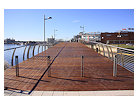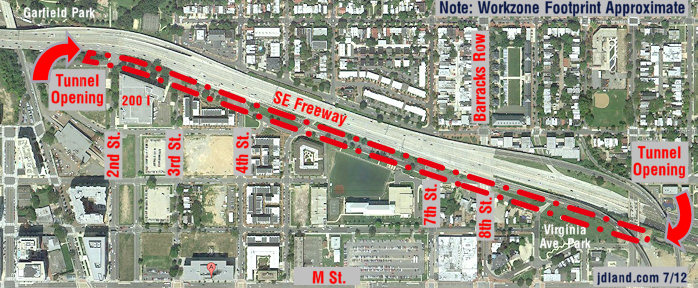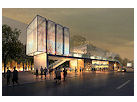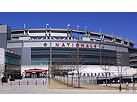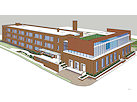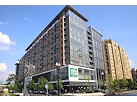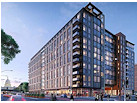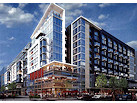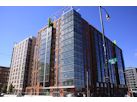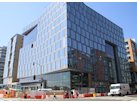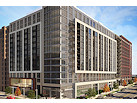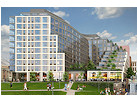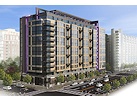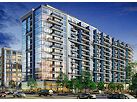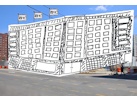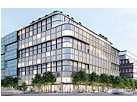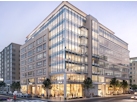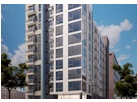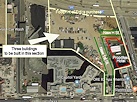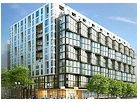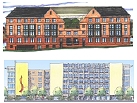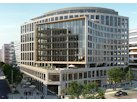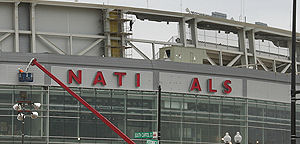|
| ||||||||||||||||||||
Please note that JDLand is no longer being updated.
peek >>
Near Southeast DC Past News Items
- Full Neighborhood Development MapThere's a lot more than just the projects listed here. See the complete map of completed, underway, and proposed projects all across the neighborhood.
- What's New This YearA quick look at what's arrived or been announced since the end of the 2018 baseball season.
- Food Options, Now and Coming SoonThere's now plenty of food options in the neighborhood. Click to see what's here, and what's coming.
- Anacostia RiverwalkA bridge between Teague and Yards Parks is part of the planned 20-mile Anacostia Riverwalk multi-use trail along the east and west banks of the Anacostia River.
- Virginia Ave. Tunnel ExpansionConstruction underway in 2015 to expand the 106-year-old tunnel to allow for a second track and double-height cars. Expected completion 2018.
- Rail and Bus Times
Get real time data for the Navy Yard subway, Circulator, Bikeshare, and bus lines, plus additional transit information. - Rail and Bus Times
Get real time data for the Navy Yard subway, Circulator, Bikeshare, and bus lines, plus additional transit information. - Canal ParkThree-block park on the site of the old Washington Canal. Construction begun in spring 2011, opened Nov. 16, 2012.
- Nationals Park21-acre site, 41,000-seat ballpark, construction begun May 2006, Opening Day March 30, 2008.
- Washington Navy YardHeadquarters of the Naval District Washington, established in 1799.
- Yards Park5.5-acre park on the banks of the Anacostia. First phase completed September 2010.
- Van Ness Elementary SchoolDC Public School, closed in 2006, but reopening in stages beginning in 2015.
- Agora/Whole Foods336-unit apartment building at 800 New Jersey Ave., SE. Construction begun June 2014, move-ins underway early 2018. Whole Foods expected to open in late 2018.
- New Douglass BridgeConstruction underway in early 2018 on the replacement for the current South Capitol Street Bridge. Completion expected in 2021.
- 1221 Van290-unit residential building with 26,000 sf retail. Underway late 2015, completed early 2018.
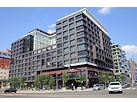
- NAB HQ/AvidianNew headquarters for National Association of Broadcasters, along with a 163-unit condo building. Construction underway early 2017.
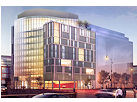
- Yards/Parcel O Residential ProjectsThe Bower, a 138-unit condo building by PN Hoffman, and The Guild, a 190-unit rental building by Forest City on the southeast corner of 4th and Tingey. Underway fall 2016, delivery 2018.
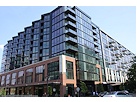
- New DC Water HQA wrap-around six-story addition to the existing O Street Pumping Station. Construction underway in 2016, with completion in 2018.
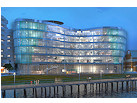
- The Harlow/Square 769N AptsMixed-income rental building with 176 units, including 36 public housing units. Underway early 2017, delivery 2019.
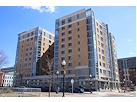
- West Half Residential420-unit project with 65,000 sf retail. Construction underway spring 2017.
- Novel South Capitol/2 I St.530ish-unit apartment building in two phases, on old McDonald's site. Construction underway early 2017, completed summer 2019.
- 1250 Half/Envy310 rental units at 1250, 123 condos at Envy, 60,000 square feet of retail. Underway spring 2017.
- Parc Riverside Phase II314ish-unit residential building at 1010 Half St., SE, by Toll Bros. Construction underway summer 2017.
- 99 M StreetA 224,000-square-foot office building by Skanska for the corner of 1st and M. Underway fall 2015, substantially complete summer 2018. Circa and an unnamed sibling restaurant announced tenants.
- The Garrett375-unit rental building at 2nd and I with 13,000 sq ft retail. Construction underway late fall 2017.
- Yards/The Estate Apts. and Thompson Hotel270-unit rental building and 227-room Thompson Hotel, with 20,000 sq ft retail total. Construction underway fall 2017.
- Meridian on First275-unit residential building, by Paradigm. Construction underway early 2018.
- The Maren/71 Potomac264-unit residential building with 12,500 sq ft retail, underway spring 2018. Phase 2 of RiverFront on the Anacostia development.
- DC Crossing/Square 696Block bought in 2016 by Tishman Speyer, with plans for 800 apartment units and 44,000 square feet of retail in two phases. Digging underway April 2018.
- One Hill South Phase 2300ish-unit unnamed sibling building at South Capitol and I. Work underway summer 2018.
- New DDOT HQ/250 MNew headquarters for the District Department of Transportation. Underway early 2019.
- 37 L Street Condos11-story, 74-unit condo building west of Half St. Underway early 2019.
- CSX East Residential/Hotel225ish-unit AC Marriott and two residential buildings planned. Digging underway late summer 2019.
- 1000 South Capitol Residential224-unit apartment building by Lerner. Underway fall 2019.
- Capper Seniors 2.0Reconstruction of the 160-unit building for low-income seniors that was destroyed by fire in 2018.
- Chemonics HQNew 285,000-sq-ft office building with 14,000 sq ft of retail. Expected delivery 2021.
1421 Blog Posts Since 2003
Go to Page: 1 | ... 33 | 34 | 35 | 36 | 37 | 38 | 39 | 40 | 41 ... 143
Search JDLand Blog Posts by Date or Category
Go to Page: 1 | ... 33 | 34 | 35 | 36 | 37 | 38 | 39 | 40 | 41 ... 143
Search JDLand Blog Posts by Date or Category
Having just about reached my limit when it comes to writing about stadium parking, I'm going to cut to the chase and pass along the biggest items from today's hearing by the Committee on Economic Development on parking and traffic issues at the new Nationals ballpark. (It's a torrent of words, so I've bolded the most important items.)
The session began with ANC representatives testifying about the community's concerns that no traffic and parking management plan has yet been unveiled, and with not many days to go (no one was sure whether it was 82 or 81 or 80 days--it's actually 79, but I didn't pipe up), neighbors are getting increasingly nervous that plans and signage won't be ready by Opening Day. While Tommy Wells's proposed Performance Parking plan could eventually become the mechanism for handling on-street parking near the ballpark, it won't be able to be in place by Opening Day, and so residents want to know how parking is going to be restricted to prevent stadium-goers from descending on nearby streets in search of free parking and bringing what has frequently been referred to as "controlled chaos."
Kwame Brown became frustrated when trying to find out who is actually in charge of coordinating all the government agencies who have a hand in the ballpark and communicating information to the public--"Who do I call? Who's driving the train?" he asked a number of times. After much back and forth with Greg O'Dell of the Sports and Entertainment Commission and Judi Greenberg from the Office of the Deputy Mayor for Planning and Economic Development, it was finally agreed that DDOT is now in charge of organizing and implementing the stadium's traffic and parking plans.
Determining this was a good step for this hearing that had been convened to discuss those plans, except for one small detail--council member Brown's Committee on Economic Development does not have oversight responsibilities for DDOT, so no one from the agency was in attendance.
Oops. (Apparently there had been plans to hold this hearing jointly with Jim Graham's Committee on Public Works and the Environment, which oversees DDOT, but that did not come to pass.)
It was said that DDOT will be unveiling the traffic operations and parking plan next week, though of course no one from DDOT was actually there to confirm or deny this.
Greg McCarthy of the Nationals testified about the team's continuing efforts to plan for the onslaught of fans, ranging from the mailing next week of parking information to season ticket holders to a planned media onslaught beginning in February to educate stadium-goers about the best ways to get to the park. (Short version: Take Metro! Walk! Bike! Park in Metro parking lots! Don't drive to the ballpark unless you've already got a parking pass!)
There still is no signed agreement between the Nationals and the city for use of RFK as free satellite parking for non-season-ticket holders, though clearly both sides anticipate it will get done, especially since the Nationals are working out the best routes for the free shuttle buses they plan to provide from RFK to the new stadium. (But Kwame Brown did not seem too enthused that the city might not be getting any revenue from the parking spaces.)
The team anticipates having 5,000 spaces for season ticket holders available in lots within walking distance to the ballpark--and, other than one lot that sits on the west side of South Capitol Street underneath the freeway, all lots will be in Southeast and none will be in Southwest.
Tommy Wells focused a number of times on the idea of the neighborhood embracing the ballpark as part of its culture and part of the character of the community. How neat it will be for residents to be able to walk to games, he said, expressing his hopes that the ballpark is a positive experience for both fans and residents. (Putting the stadium there "was not a hostile act by the government," he said). He also spoke of how the stadium's on-time and on-budget completion should be a real celebration for the city, but that he doesn't want it to become known as the "ballpark with a traffic catastrophe."
My favorite moment of the hearing was when discussion turned to how exactly the onslaught of papal groupies will be handled when the Pope comes to the ballpark on April 17: I realized that all this time I had assumed Pope = Mass = Sunday, when in fact the event will be on a Thursday morning, which will make traffic and parking that much more of a challenge. Start planning your vacation day now.
Other items of interest:
* Charter buses are expected to be parked across the South Capitol Street bridge during games.
* The Nationals have secured 4,000 of the 5,000 spaces they are eyeing near the ballpark, and expect to have the other 1,000 by Opening Day. There will be about 3,000 spaces at RFK, in Lots 7 and 8, and the team will be running a test of the RFK shuttle buses on Friday.
* There will be 130 handicapped parking spaces in the two lots on the ballpark site.
* The Navy Yard Metro station is expected to be ready by Opening Day.
* The Nationals will be responsible for clean-up around the ballpark and surrounding streets after games, most likely through an augmentation of the Capitol Riverfront BID's "clean teams".
* There are still plans for two job fairs to be held in Southwest, perhaps on Feb. 9 and 23 at Greenleaf Rec Center.
There's probably other items I missed that some people might be interested in, but I think that's more than enough for a Friday night.
It's anticipated that a joint hearing of both the Committee on Economic Development and the Committee on Public Works and the Environment--which oversees DDOT--will be scheduled soon.
The broadcast of the meeting is already available on demand, if you have three hours of your life you're not doing anything with. I've also posted the prepared statements of the witnesses from today, which you should definitely read to get more information than I've been able to summarize here. Also available is a press release from Kwame Brown's office about the hearing, in which he calls for "enhanced coordination from DC agencies and increased public involvement."
UPDATE: Here's the WashTimes article on the hearing. And the Examiner's.
|
Comments (0)
|
A feature story from MLB.com: "The new Nationals Park was the ultimate classroom Friday for a group of students from Cardozo High School who got to see and learn from construction workers finishing up the stadium. [..] The students are taking part in the Academy of Construction and Design, a public-private partnership at Cardozo that allows students to get hands-on experience in a trade before graduation."
|
Comments (0)
More posts:
Nationals Park
|
Agendas are out for two public meetings on Monday night (Jan. 14) that have Near Southeast items of interest:
*ANC 6D's agenda includes presentations and requests for support on the following: a new request for an alley closing on the southern end of the block bounded by Half, M, N, and South Capitol (B17-0552, "Closing of a Public Alley in Square 700"); the Capitol Gateway Overlay Review for 1111 New Jersey Ave., which will be at the Zoning Commission on Jan. 31; and new design/modified second-stage PUD for RiverFront on the Anacostia (Florida Rock), which is expected to go to the Zoning Commission in the next few months. The meeting is at St. Augustine's Church, 6th and M Streets, SW, at 7 pm.
* The Zoning Commission will hear requests for "minor modifications" to William C. Smith's 250 M Street project and Monument's Half Street project; alas, I haven't been able to find out what these modifications are. That meeting is at 6:30 pm at 441 Fourth St., NW, and is also available via live webcast.
I should also mention here that last night the Zoning Commission voted preliminary approval of a series of text and map amendments at the Yards, most of which are far too dull for even me to get into; read the hearing announcement if you want more details.
|
Comments (0)
|
A reminder that on Friday (Jan. 11) at 10 am there's a public oversight roundtable by the city council's Committee on Economic Development on parking and traffic plans for the stadium. Note that this is not the official hearing on the legislation introduced this week by Tommy Wells to regulate on-street parking in areas around the stadium and Capitol Hill, though I would imagine it should get touched on. But there's plenty of other issues to talk about as well--parking lots, traffic and pedestrian flow, Metro, and so many other items that fans and neighbors are waiting to hear about. It's going to be broadcast live on DC Cable 13 (and on the web simulcast), but I'm expecting this hearing to be so lively and informative that I'm actually going to shut down the laptop, take off my fuzzy slippers, and attend in person. (For less brave souls, the hearing should be available via both replays and on-demand viewing within a few days.) Watch for my summary of it all later Friday afternoon.
UPDATE: I have indeed survived the hearing, but will need some time to pull together a summary. In the meantime, the one headline worth passing along immediately is that Nationals season ticket holders should expect to get their parking information in the mail next week. A package showing lot locations and prices is at the printer as we speak, and recipients will choose their preferred location and cost and return it to the Nationals; they'll then receive their parking pass and exact parking location after that.
More to come.
|
Comments (0)
More posts:
parking, Nationals Park
|
In the past few days I've mentioned the start of construction on the first of the temporary surface parking lots at Capper and the transformation of an existing lot at 1100 South Capitol into a monthly lot managed by Colonial Parking. Today I see that the dirt is being dug up at 1000 South Capitol, which had a public space permit approved a few weeks ago for the construction of a parking lot. This property is owned by Lerner Enterprises (yes, the same Lerners that own the Nationals) and they have eventual plans for an office building on the site, but it shouldn't be a surprise that they would give this land over at least temporarily to the Ballpark Parking Cause.
Additional dispatches from today's drive-around:
* Equipment has arrived on site at 1345 South Capitol, presumably for the start of excavation for this 276-unit residential project across the street from the ballpark.
* The DC Foreign Car Shop at 31 K Street and the buildings along First Street and N north of the ballpark are still standing;
* A very affable-looking "Hospitality Ambassador" from the Capitol Riverfront BID was answering questions with a smile at the Navy Yard Metro entrance;
* The amount of construction and roadwork from New Jersey Avenue west to South Capitol really is unbelievable. (I rarely drive through the neighborhood during the day on weekdays, so most of you long-suffering residents and commuters are already well aware of this.) But seeing it in full swing just reinforces my New Year's resolution to restrict my photo treks to Sundays, when the commotion is taking its Day of Rest.
UPDATE: One more tidbit: a permit has been approved to remove the underground storage tanks at the BP Amoco at South Capitol and N. I had thought that maybe it was only temporarily closed because of the construction on N Street, but this probably means it's gone for good. As for what might appear in its place--the land is part of Monument Realty's vast holdings north of the ballpark, but no development plans for the site have been announced. In the meantime, I bet it would be a handy spot for a parking lot!
|
Comments (0)
More posts:
1000 South Capitol, 1221 Van, Monument/South Capitol St., parking, square 697, Nationals Park
|
I haven't seen it with my own eyes yet, but reports are trickling in that work began yesterday to hang letters on the southwest side of the ballpark that presumably are on their way to spelling NATIONALS. I'll try to retrieve photographic evidence of it today.
UPDATE: Pat, I'd like to solve the puzzle:
UPDATE, 1/13: All done.
|
Comments (0)
More posts:
Nationals Park
|
Time to dip back into the What's the Deal With...? mailbag, where once again I'm being asked fabulous questions that I don't actually have any answers for. But that hasn't stopped me yet....
* Readers B. and K. are the most recent readers to ask about the Public Space Storage building on South Capitol between M and N, just a few feet north of the ballpark, wondering whether it has any plans to close. I know that Monument Realty was interested in acquiring the building, since it owns the lots just to the building's south as well as all other parts of the block not owned by WMATA, but that was before Metro awarded the Southeastern Bus Garage and its parking lot (on the north side to the storage building) to Akridge. It's certainly a valuable piece of land, and I don't think it's going out on a limb to say that I doubt it will be there many years from now, but as of this point I've heard of no deals.
* Reader R. has asked about Canal Park, which continues to appear stalled, with no public pronouncements on it in months. (And with that "Spring 2008" still displayed for all to see on the sign at Second and M.) Is it still the school buses throwing up the roadblock, which is what we last were told? Is there some new wrinkle? I haven't heard anything, I'm sad to report.
* Reader F. asks about Ann's Beauty and Wig Shop, the dazzlingly pink building sandwiched between St. Matthew's and Onyx at 125 L Street, wondering if it's going to be sold. Ann's came to this block in 2005, after I believe being forced out of Waterside Mall in SW, and the owner has apparently been pretty vehement with potential suitors that she has no intention of selling. Perhaps the pending sale of St. Matthew's to Ruben Companies could change that, but as of now, I've heard nothing.
That's the best I can do for now--absolutely no useful information at all! No doubt there's scuttlebutt on each of these that I'm not privvy to, but I continue to be unsuccessful in my quest to get all city officials and private-sector parties operating in Near Southeast to inform me at all times about all their dealings. It's almost like they think I'm just some sort of powerless pesky neighborhood blogger or something....
Got a WTDW question? (maybe even one that I might know the answer to?) Pass it along. But I'll close with a hint--when it comes to oft-discussed projects around Near Southeast, as soon as I hear information that I can confirm, I post it. (I do tend to stay away from posting rumors, and considering some of the ones I've heard over the years that have turned out to be fabulously incredibly wrong, I don't regret this.) If you haven't seen any updates lately about Canal Park, or Capitol Quarter, or the Post Plant, or any other project, it's because nothing new has come my way. I'm as desperate to post the latest news flashes as you are to read them....
|
Comments (0)
|
January's Hill Rag is now online, with a number of articles on Near Southeast-related issues (most of which I've covered here in recent weeks). There's a big piece on Tommy Wells' Performance Parking Pilot Plan, though it was written before yesterday's official introduction of the legislation. Their Loose Lips-type anonymous columnist "The Nose" also talks about the parking plan, dubbing Tommy Wells "The Pimp of Parking." (Lovely.) There's also a piece spelling out the Capitol Hill Restoration Society's objections to DDOT's plans to renovate the 11th Street Bridges. And there's a wrapup of the December ANC 6D meeting, where representatives of the Nationals pledged much cooperation with the neighborhood and the ANC voted to support the ballpark's liquor license (I wrote about this meeting here).
|
Comments (0)
|
Back in September 2006, WMATA solicited proposals to develop four of its properties, including the east entrance of the Navy Yard Metro station at New Jersey and M and the 14,100-square-foot parcel on the southwest corner of Half and L streets, SE, where the Navy Yard Metro station's "chiller" is located. While the sale of the New Jersey Avenue land to Donohoe was approved by the WMATA board in December, there hasn't been even a smidgen of news about the chiller site in more than a year.
But now, nestled deep in the posted paperwork for Thursday's WMATA board meetings is an expected agenda for the Feb. 14 meeting of the Planning, Development and Real Estate Committee that lists "Navy Yard Station Chiller Site Developer Selection" as one of the action items. Citing the ongoing negotiations, Metro wouldn't give me any additional information, so we may have to wait for Valentine's Day for the "reveal," unless someone blabs beforehand. Once the mystery developer's section is approved by the WMATA board, the final negotiations for an agreement would begin. The property is currently assessed at just under $4 million.
The solicitation described WMATA as "looking for innovative plans . . . that will yield quality developments for the local communities, increase transit ridership, enhance the local tax base and provide a stream of revenue to WMATA for capital needs." Proposals were also supposed to follow the principles of "transit-oriented development" -- "providing safe, walkable, mixed-use communities that emphasize transit connections and reduce auto dependency." While doing all that, the site's developer would still have to replace the chiller operations either on site or somewhere close to the Navy Yard station.
There's also a 7,700-square-foot privately owned parcel next to the chiller on L Street, assessed at $1.72 million and currently home to the Empire and DC Flyer Cab Company. It has had "Build to Suit" signs flying for quite some time, so it's possible that the developer of the chiller site could acquire that land as well. And this spot is already surrounded by current and planned office projects, with the completed 20 M Street and the planned 1100 South Capitol on adjoining lots, and the starting-any-minute-now 1015 Half Street across L Street. See my Square 698 page for photos.
|
Comments (0)
|
 As expected, Tommy Wells just introduced to the city council the "Performance Parking Pilot Zone Act of 2008", which would create a three-year pilot project to "better manage curbside parking, especially around the stadium and the impacted area." Wells said the goals of the bill are to protect residential parking in neighborhoods and to support local business, and commented that "it is clear that a couple thousand well-managed curbside spaces are better than two-to-three times as many unmanaged spaces." Council chair Vincent Gray co-introduced the bill, and council members Catania, Brown, Barry, and Bowser signed on as co-sponsors. I should have a link to the text of the bill itself later today, but if you can't wait, read my entry from a few weeks ago describing the plans, since I'm too lazy this morning to re-summarize.
As expected, Tommy Wells just introduced to the city council the "Performance Parking Pilot Zone Act of 2008", which would create a three-year pilot project to "better manage curbside parking, especially around the stadium and the impacted area." Wells said the goals of the bill are to protect residential parking in neighborhoods and to support local business, and commented that "it is clear that a couple thousand well-managed curbside spaces are better than two-to-three times as many unmanaged spaces." Council chair Vincent Gray co-introduced the bill, and council members Catania, Brown, Barry, and Bowser signed on as co-sponsors. I should have a link to the text of the bill itself later today, but if you can't wait, read my entry from a few weeks ago describing the plans, since I'm too lazy this morning to re-summarize.UPDATE: Here is Tommy Wells's press release, which is a handy overview of the new legislation, and the bill itself. Some bullet points:
* The areas to be covered by the pilot include all areas south of the Southeast-Southwest Freeway from 10th Street SE to 12th Street SW and from the freeway north to East Capitol Street between Washington Avenue, SW and 11th Street, SE.
* Fines would start at $50 for parking overtime and would just upward if needed "to dissuade ballpark patrons from parking illegally in neighborhoods";
* Sixty percent of the meter revenues would be used to repay the cost of the new multi-space meters (pictured at left) and related signage, 20 percent would be deposited in the city's Transportation Unified Fund, and the rest would be used for "non-auto transportation improvements" within the zone, such as streetscape upgrades for pedestrians, biking infrastructure improvements, and better bus and rail signage.
* A "pay-by-cell phone" zone could be created to allow for electronic payments for parking. (Cool!)
Specifics still to be spelled out:
* Designations of streets as residential, retail, or ballpark-adjacent, which will govern which type of parking restrictions a street has;
* Rates for the meters;
* Days and hours of meter operations;
* Parking time limits and Residential Permit Parking restriction hours;
* A guest-pass system to allow residents to better handle visitors.
Two community meetings have been scheduled, on Jan. 22 at 401 I Street, SW, and Jan. 23 at 301 North Carolina Ave., SE. Both are from 6:30 to 8 pm. There will also be a hearing at some point by the council's Committee on Public Works and the Environment, chaired by Jim Graham. And it will also no doubt come up for discussion at this Friday's council Committee on Economic Development oversight roundtable on "Parking and Traffic Plan for the Nationals' Stadium" (Jan. 11 at 10 am).
Here's a Tommy quote from the press release: "Some of the best thinking in the country has gone into this proposal. Parking is already at a premium in our neighborhoods, but giving free curbside parking to ballpark visitors isn't managing the problem, it's only inviting more congestion and traffic."
I imagine this is just the beginning of a flood of information on the plan. Stay tuned.
|
Comments (0)
More posts:
parking, Nationals Park
|
Two quick items to start the day:
* Nearby neighbors who've been concerned about recent early morning work at the Onyx/100 M construction site (before the allowed start time of 7 am) should note today's Public Space Permit feed, showing that a permit has been approved for 100 M that allows work from 6 am to 8 pm Monday through Friday until March 4.
* Miss Chatter of Just a Nats Fan took a boat ride up the Anacostia to the ballpark, and posted both video and photos.
More news expected later, since the city council meets in a few minutes and it's expected that Tommy Wells will introduce his "curbside management" bill (what those of us who are a bit slow on the uptake would better know as "on-street parking"). Live video here.
UPDATE: If anyone working at 80 M Street, or living in Capitol Hill Tower, feels like peeking out the window and looking over at the old Nation site today, let me know if you see that last remaining building being demolished. A reader reports talking to folks on-site yesterday who said that the building could be coming down today....
|
Comments (0)
|
Tuesday's Post has the first details emerging about Pope Benedict XVI's April 17 mass at Nationals Park: "At first, the decision was made to put the altar at second base, which is where Yankees Stadium places the altar for papal Masses." But "organizers realized that they could fit in 4,000 more seats -- for a total of 45,000 -- if they placed the altar at centerfield." If you're going, plan to get up early: "The doors will open about 6:30 a.m. for pre-Mass activities, including music and videos." As for tickets? "Plans for distributing tickers have not been completed. But, in the past, tickets to major Catholic events have been distributed through parishes and Catholic organizations." Who gets to go? "The archdiocese has been asked whether non-Catholics can attend (yes) and whether the Mass is part of the Nationals baseball ticket package (no). The archdiocese is trying to keep the free tickets from popping up on e-Bay and falling into the hands of scalpers."
|
Comments (0)
More posts:
Nationals Park, Stadium Events
|
Sometime within the past few weeks, the surface parking lot at 1100 South Capitol Street has come under the management of Colonial Parking. The spiffy new sign (and the Colonial web site) indicate that it is open for monthly parking only, at a rate of $80 a month. It's on the site where Ruben Companies plans eventually to build its SC1100 office project, but no start date has been announced for that.
As for whether it could possibly be one of the lots that the Nationals are planning to use for season ticket holder parking, I have no information on that, but it's certainly interesting that this lot has suddenly gotten big-time management....
And, in case you didn't see it mentioned in my photo update yesterday, work has begun on the Capper parking lots along Third Street. Some PVC pipes are piled up on the two blocks, and some trench digging is underway at Third and I.
|
Comments (0)
|

It was time this weekend to catch up on photos for a bunch of locations, including the most aged batch of them all, the views of the ballpark's northern footprint along N Street, which haven't been updated since September, so you can now have your fill of photographs of imposing parking garages. The curbs and historic streetlamps are now in, and N Street has been paved from South Capitol to Half, and it looks like the paving east to First isn't far behind. So even though the half-shadow half-sunlight conditions weren't the best to work with, I took full updates of the First, Half, Cushing, and Van intersections along N, all of which you can see here.
One thing that really struck me today for the first time is just how wide First Street is becoming, as you can see in this batch of northward-looking photos. I also saw that all the businesses on the west side of First south of M have now vacated--as you can see above, it's odd to see those old about-to-be-demolished buildings with sparkly new sidewalks and streetlamps in front of them.
I also trudged around the road construction along First Street north of M as best I could to update photos of 100 M, Onyx, and 70/100 I, and also got a good new batch of 55 M photos as well as the always showy views from the freeway at South Capitol. And I finally got the last set of old Capper Seniors photos to show that the building is indeed gone. And heaven help me I even took a photo of the new sign advertising the Square 696 project, and also a few shots barely showing that work started this week on the first Capper parking lot at Third and I (because there's nothing more exciting than documenting the construction of a parking lot). There's just too much change, and I couldn't stop until it had all been documented! Aaaiiiieeeeee!!!!
For those of you brave enough to try, here's all the photos from the past two days on one page. (Thank heavens I've done a lot of work over the past year or so to automate the update process as much as possible.) Don't forget to click on the  icons to see all photos of a location over the years....
icons to see all photos of a location over the years....
 icons to see all photos of a location over the years....
icons to see all photos of a location over the years....|
Comments (0)
|
Digging in the DC land records database late on a Friday afternoon (isn't that what everyone does to get ready for the weekend?), I see that the ExxonMobil Corporation deeded its land at South Capitol and I in November to the ExxonMobil Foundation. There's nothing stated in the deed about any planned uses for the land, except to spell out restrictions on future uses and requirements for cleanup since the site may have contaminated soil. As for the foundation itself, a little blurb describes it as the "primary philanthropic arm of the Exxon Mobil Corporation in the United States. The Foundation and the Corporation engage in a range of philanthropic activities that advance education, health and science in the communities where ExxonMobil has significant operations." Is this the prelude to selling the land (assessed at $16 million in 2008) and having the foundation get the proceeds? Or is something else afoot?
|
Comments (0)
|
The crime feed data I display on the home page has been temporarily suspended, according to the city's Office of the Chief Technology Officer. No word on why (other than that it was at the request of MPD) or when it will return....
|
Comments (0)
More posts:
|
The Washington Business Journal has a huge "Looking Forward" piece in today's print edition, and its first prediction is this: "The place to be in D.C. in 2008 will be the Southeast waterfront." It then gives a quick run-down of what's going on (some baseball stadium project leads the list), and references the expected lack of amenities near the ballpark until Monument Half Street opens in 2009. Also: "Real estate insiders will be watching to see when the first major private office tenant lands in Southeast. Both CNN and National Public Radio have short-listed sites, but no company has committed to pioneering the private office sector yet." And: "Major work is expected to get under way in 2008 at The Yards, which Forest City Washington is developing in the area formerly known as the Southeast Federal Center. The first offerings at the 42-acre project will be residential and retail, with projects slated to open in 2009." But JDLand readers knew all this already....
|
Comments (0)
|
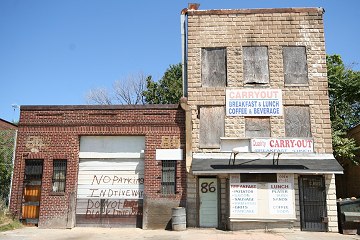 In today's attempt to read the Building Permit tea leaves, I see that a plumbing and heating company has received a slew of permits along N, Cushing, and First streets, where Willco Construction is planning a 500,000-square-foot office/residential/retail project. I'm not an expert in these things, but a few years of watching the flow of permits has shown me that plumbing and heating companies get permits to shut off the pipes prior to buildings being demolished, and these addresses do have raze permits approved for them. Details about the Willco project are few, and there's been no announcement of any start date.
In today's attempt to read the Building Permit tea leaves, I see that a plumbing and heating company has received a slew of permits along N, Cushing, and First streets, where Willco Construction is planning a 500,000-square-foot office/residential/retail project. I'm not an expert in these things, but a few years of watching the flow of permits has shown me that plumbing and heating companies get permits to shut off the pipes prior to buildings being demolished, and these addresses do have raze permits approved for them. Details about the Willco project are few, and there's been no announcement of any start date. And now that 55 M's construction has mostly obscured these lots from the view of the Half Street web cam, I'm hoping those of you at NGA and 80 M Street with bird's eye views of these spots can drop me a line if you see any demolition happening.
|
Comments (0)
More posts:
staddis, Square 701
|
Nineteen building permits for various addresses around Capitol Quarter have been approved in the last week, as you can see in the Building Permits feed (check it out, homeowners-to-be--your address might be there!). These don't mean that houses will start popping up next week, but it is another step in the long process toward work getting underway. As I've mentioned before, the digging you see currently in the old Capper area is the work on the public infrastructure; the laying of the pipes and utilities under the homesites themselves (known as the private infrastructure) will come next, followed by the "vertical construction" of the houses, which people are still telling me should start in the spring.
|
Comments (0)
More posts:
Capper, Capitol Quarter
|
A hearing had been scheduled for today in front of the Alcohol and Beverage Control board about the ballpark's liquor license application; but I've been told that no one filed a protest about the application, so the public hearing was cancelled. The ABC board still must review the application and rule on it, presumably in the near future. For a little more background, read my post from last month about the ANC's decision to support the application--there were concerns that a protested ABC license might spur either the city council or the DC Sports and Entertainment Commission to enact a license outside of the ABC's regulatory reach.
|
Comments (0)
|
1421 Posts:
Go to Page: 1 | ... 33 | 34 | 35 | 36 | 37 | 38 | 39 | 40 | 41 ... 143
Search JDLand Blog Posts by Date or Category
Go to Page: 1 | ... 33 | 34 | 35 | 36 | 37 | 38 | 39 | 40 | 41 ... 143
Search JDLand Blog Posts by Date or Category



